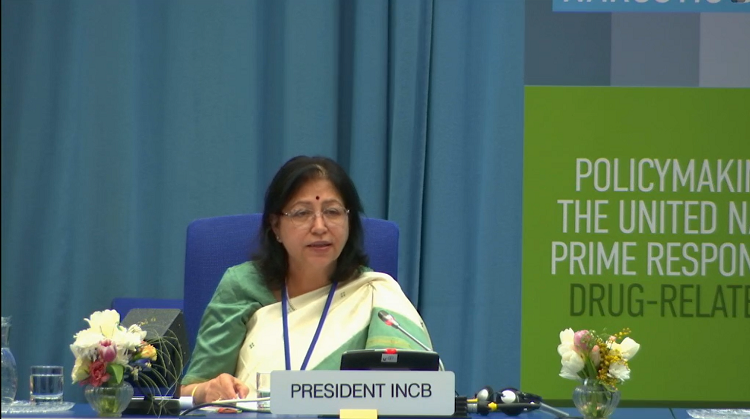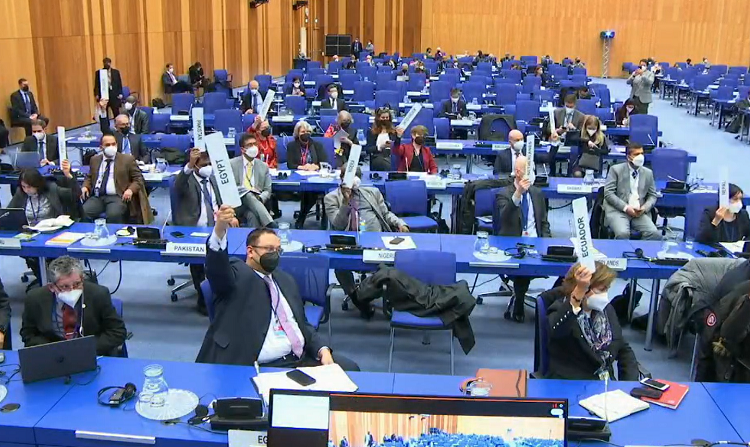International Narcotics Control Board participates in sixty-fifth session of the Commission on Narcotic Drugs

VIENNA, 23 March 2022 - The Commission on Narcotic Drugs (CND) concluded its sixty-fifth session on 18 March 2022. The session, which commenced on 14 March, took place in a hybrid setting due to restrictions related to the ongoing COVID-19 pandemic. Despite these restrictions, 1,300 people registered to participate, representing 129 Member States, 16 intergovernmental organizations and 80 non-governmental organizations.
The International Narcotics Control Board (INCB) was represented in a variety of ways during the session. The INCB President, Ms. Jagjit Pavadia, addressed the plenary at the opening of the session and on agenda items related to INCB's work, availability of controlled substances and on challenges in the review of substances for international control. The President of the Board recommended the scheduling of 3 fentanyl precursors, which was subsequently adopted by the Commission. Ms. Pavadia also joined the CND Chair, the Executive Director of the United Nations Office for Drugs and Crime and the Director General of the World Health Organization in making a JOINT CALL TO ACTION to improve the availability of controlled substances, including in emergencies.
The President of the Board was a panelist at the High-Level Event on addressing the Global Synthetic Drug Problem organized by UNODC on 16 March 2022 to discuss strategies to tackle the global synthetic drug problem including the opioid crisis through interagency and international cooperation. The President of the Board highlighted the successes achieved by INCB through the Global Rapid Interdiction of Dangerous Substances (GRIDS) Programme, Project ION, Opioids project and use of PEN Online, PICS and other tools and platforms to achieve tangible results in neutralizing and preventing illegal trafficking of dangerous substances.
On 17 March 2022, Ms. Pavadia held an informal dialogue with the Vienna NGO Committee on Drugs, recognizing the crucial role of civil society organizations in meeting the objectives of the drug control conventions and the importance of cooperation between civil society and the Board.
In addition to the above, INCB also held three side events during the session. On 15 March, INCB organized the virtual side event Preventing and investigating the diversion of equipment used in the illicit manufacture of drugs: Guidance for policy makers and launched a guidance document for policy makers on illicit drug manufacturing equipment and article 13 of the 1988 Convention. The side event was cosponsored by the Governments of Canada, Germany, Thailand, the United States of America and Europol. More information related to materials and equipment used in illicit drug manufacture can be found on the INCB web page dedicated to this topic: https://www.incb.org/incb/en/precursors/materials-and-equipment.html.
On 18 March, INCB's Global Interdiction of Dangerous Substances (GRIDS) Programme and the Government of Japan, along with the Governments of the United Kingdom and the United States of America, hosted the side event New Approaches to National NPS Control: What are "Generic Approaches?" Ms. Pavadia presented an overview of various generic approaches to national control of new psychoactive substances (NPS), followed by presentations by experts from Japan, the United Kingdom and the United States on the approaches used in their countries.
On 18 March, the Narcotics Control and Estimates Section of the INCB secretariat organized - with the support of Argentina, Australia, Costa Rica, Israel, Germany, Japan, the Netherlands, New Zealand, Paraguay, Portugal, South Africa, Spain, Switzerland, the United Kingdom, the United States, the African Union Commission, the European Union, and the UNODC Laboratory and Scientific Service - the side event International Standards for Reporting Cannabis and Cannabis-Related Substances for Medical Purposes. At this event, Ms. Pavadia reiterated INCB's commitment to work with Member States to find a common approach in the reporting and monitoring of cannabis and cannabis-related substances for medical and scientific purposes. A panel of representatives of competent national authorities shared best practices and provided insights on the impact that this work will have at the national level. In addition, Mr. Conor Crean, UNODC Laboratory and Scientific Service, presented the newly-published UNODC manual on recommended methods for the identification and analysis of cannabis and cannabis-based products.
During the sixty-fifth session of the Commission, the President of the Board met with representatives of Member States, including countries that are major manufacturers/suppliers of opiate raw materials & opiates for medical purposes. This is an important part of INCB's efforts to maintain a balance between the supply of and demand for such controlled substances, prevent excessive stocks and ensure their availability for medical and scientific purposes while preventing diversion to illicit channels.
INCB is committed to working with Member States, partner organizations and civil society organizations to meet the objectives of the drug control conventions and make progress on the Sustainable Development Goals, particularly SDG3 on health and well-being.
